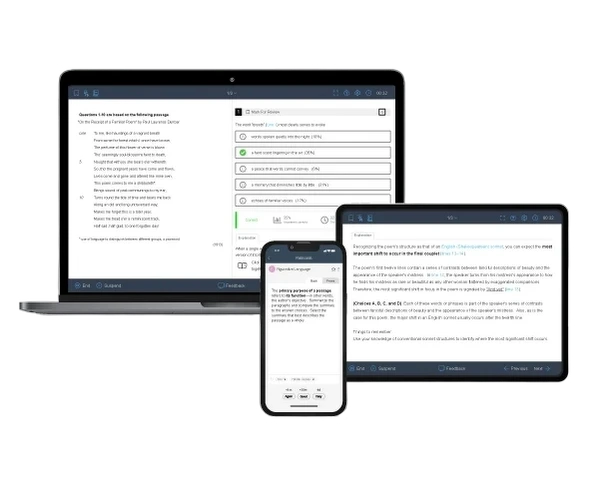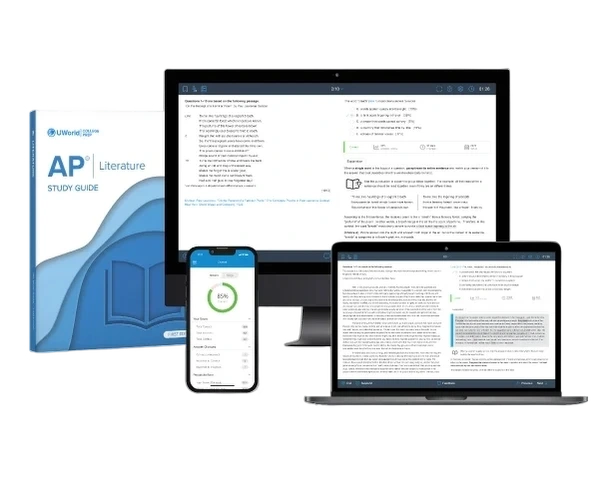The AP Lit exam is now fully digital, with all responses submitted through the BluebookTM testing app. Practicing in a digital environment will help you get comfortable with the exam format and timing. Familiarizing yourself with the digital interface will also ensure you're ready to navigate seamlessly between the multiple-choice and free-response questions, minimizing any technical stress on exam day.
The AP Lit exam format consists of 2 main sections:
- 55 multiple-choice questions (MCQs) that you’ll have 1 hour to complete
- 3 free-response questions (FRQs) that you’ll have 2 hours to complete
Here’s how each section appears in the AP Lit exam booklet:
| Multiple-Choice Questions | Free-Response Questions |
|---|---|
|
|
Let's look at each section and what you'll be assessed on.
AP Lit Exam Question Types
As mentioned above, the exam includes multiple-choice and free-response questions. Here’s a detailed AP Lit exam breakdown to better understand its structure and content.
Multiple-Choice Questions
This section requires you to read passages from a wide range of literature and answer questions about them. Each MCQ will have 4 answer choices. The passages may be presented in the form of a few paragraphs from a novel, a play, or even an entire poem. The associated questions will ask you to make inferences from selected lines, recognize the impact of literary techniques such as satire or repetition, and evaluate the author's use of imagery.
Each question is worth 1 point. There is no penalty for a wrong answer, so answer all the questions, even if you have to guess.
There are 9 units in the AP English Literature curriculum, with each weighted differently on the exam:
| Units | Exam Weight |
|---|---|
| Units 1, 4, and 7: Short Fiction | 42-49% |
| Units 2, 5, and 8: Poetry | 36-45% |
| Units 3, 6, and 9: Longer Fiction or Drama | 15-18% |
When preparing your study schedule, keep this distribution in mind.
The AP Lit exam format emphasizes specific skills that you should practice throughout the year to analyze texts effectively.
These are the 7 skills you'll acquire during your AP Lit course and how they are weighted on the exam:
| Skills | Weight |
|---|---|
| Explain the function of character | 16-20% |
| Explain the function of setting | 3-6% |
| Explain the function of plot and structure | 16-20% |
| Explain the function of the narrator or speaker | 21-26% |
| Explain the function of word choice, imagery, and symbols | 10-13% |
| Explain the function of comparison | 10-13% |
| Develop textually substantiated arguments about interpretations of a part or all of a text | 10-13% |
To ace the MCQ section, read our article on how to approach AP English Literature multiple-choice questions. The page also includes step-by-step instructions for answering each question.

Free-Response Questions
AP instructors and college professors score the FRQ section manually, as opposed to the multiple-choice section, which is computer-graded. The AP readers review each answer and score it based on different criteria set for each question. Each essay is graded on a scale of 0 to 6 using the College Board® scoring rubric.
Each FRQ tests your ability to:
- Answer the prompt with a clear thesis statement and offer a supportable interpretation
- Choose and incorporate evidence to back your claim
- Elaborate on how the evidence reinforces your claim
- Apply correct grammar and punctuation to convey your argument effectively
Since there is no 1 correct answer in the FRQ section, the below rubric is used to maintain consistency in the scoring structure.
| Reporting Category | Points | Scoring Criteria |
|---|---|---|
| Row A: Thesis | 0-1 points |
|
| Row B: Evidence and Commentary | 0-4 points |
|
| Row C: Sophistication | 0-1 points |
|
Here is what FRQ questions look like:
-
Free-response question 1: Poetry Analysis
This question type requires you to read a 100-300 word poem excerpt. You will be asked to establish a relationship or connection between 2 things, analyze the poetic techniques and elements, and provide evidence to support a claim.
-
Free-response question 2: Prose Fiction Analysis
This question type requires you to read a 500-700 word prose fiction passage. You will be asked to reflect on what the author wants to convey, analyze literary devices to establish the author’s claim, and provide reasons to support your arguments.
-
Free-response question 3: Literary Argument
This question type gives you a literary concept or idea and a list of about 40 literary works to choose from. You must choose a work of prose fiction from their reading or a list provided by the instructor and examine how the literary principle or idea indicated in the question adds to an overall understanding of the work.
Our article on how to approach AP English Literature and composition free-response questions will help you prepare for the FRQ section. The page also contains step-by-step instructions on how to answer each question.
How UWorld Can Help
To excel in both sections of the AP Lit exam, consider using our tailored resources:
- AP English Literature Online Prep Course: Get our comprehensive, all-in-one online study solution that simplifies complex concepts with colorful illustrations.
- AP English Literature Practice Exam Questions: Practice over 750 exam-like questions to sharpen your skills.
- AP English Literature Study Guide: Master key concepts with our structured approach. The study guide is available in print and digital formats.

References
- (2024). AP English Literature and Composition. College Board. Retrieved on January 15, 2025 from https://apstudents.collegeboard.org/courses/ap-english-literature-and-composition/assessment
- (2024, Fall). AP English Literature and Composition Course and Exam Description. College Board. https://apcentral.collegeboard.org/media/pdf/ap-english-literature-and-composition-course-and-exam-description.pdf
Read More About AP English Literature and Composition Exam
Looking for a simpler AP English Literature course description? Visit this page for detailed info on course units, key topics, concepts, and other necessary details.
AP English Literature Scoring GuideCurious about how the AP English Lit exam is scored? Find relevant information on the scoring system, criteria for free credits, and how to use the score calculator.
How to Study for AP English LiteratureEnhance your AP English Literature exam prep with expert tips, practice questions, and in-depth insights designed to help you succeed. Click here to learn more today!
Best AP English Literature Study Guide ComparisonCompare the best AP English Literature study guides! See how Kaplan, Barron's, and Princeton Review stack up against UWorld for comprehensive exam prep.
Best AP English Literature Prep Course ReviewDiscover the best AP Literature prep courses available. Compare key features, pricings, reviews, and benefits to select the course that best fits your learning.
How to Self-Study for AP English LiteratureWant to ace AP English Literature on your own? Follow this expert self-study guide with tips, tricks, and tools to prepare effectively for the exam.



